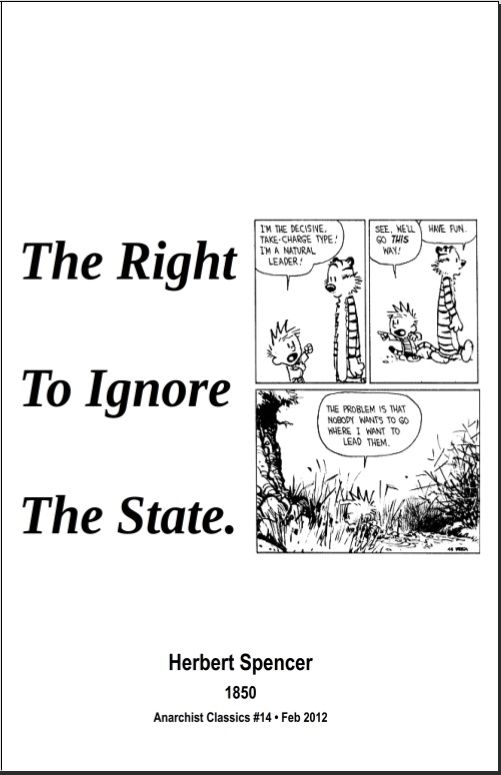C4SS has teamed up with the Distro of the Libertarian Left. The Distro produces and distribute zines and booklets on anarchism, market anarchist theory, counter-economics, and other movements for liberation. For every copy of Herbert Spencer’s “The Right to Ignore the State” that you purchase through the Distro, C4SS will receive a percentage. Support C4SS with Herbert Spencer’s “The Right to Ignore the State“.
$2.00 for the first copy. $1.00 for every additional copy.
This lost classic was originally published in 1850 as a chapter of Herbert Spencer’s book Social Statics. When Spencer re-issued Social Statics late in his life he revised it to remove much of the most radical material, including this chapter. However, earlier American facsimile editions continued to circulate, and the essay was widely read and discussed among American and English Anarchists, who republished the essay independently. As Tucker wrote of his pamphlet edition, “Though Spencer, when in his later life he revised ‘Social Statics,’ suppressed this chapter, he never answered it, and it remains the best bit of political philosophy that ever came from his pen. It might well be called ‘The Right of Civil Disobedience,’ as a companion-work to Thoreau’s ‘Duty of Civil Disobedience.’ The two certainly constitute a pair of Anarchist classics. . . .” (Liberty XVI.6, p.1)
As a corollary to the proposition that all institutions must be subordinated to the law of equal freedom, we cannot choose but admit the right of the citizen to adopt a condition of voluntary outlawry. If every man has freedom to do all that he wills, provided he infringes not the equal freedom of any other man, then he is free to drop connection with the state — to relinquish its protection and to refuse to pay toward its support. . . .
Nay, indeed, have we not seen that government is essentially immoral? Is it not the offspring of evil, bearing about it all the marks of its parentage? Does it not exist because crime exists? Is it not strong — or, as we say, despotic — when crime is great? Is there not more liberty — that is, less government — when crime diminishes? And must not government cease when crime ceases, for very lack of objects on which to perform its function? Not only does magisterial power exist because of evil, but it exists by evil. Violence is employed to maintain it, and all violence involves criminality. Soldiers, policemen, and jailers; swords, batons, and fetters are instruments for inflicting pain; and all infliction of pain is in the abstract wrong. . . .








